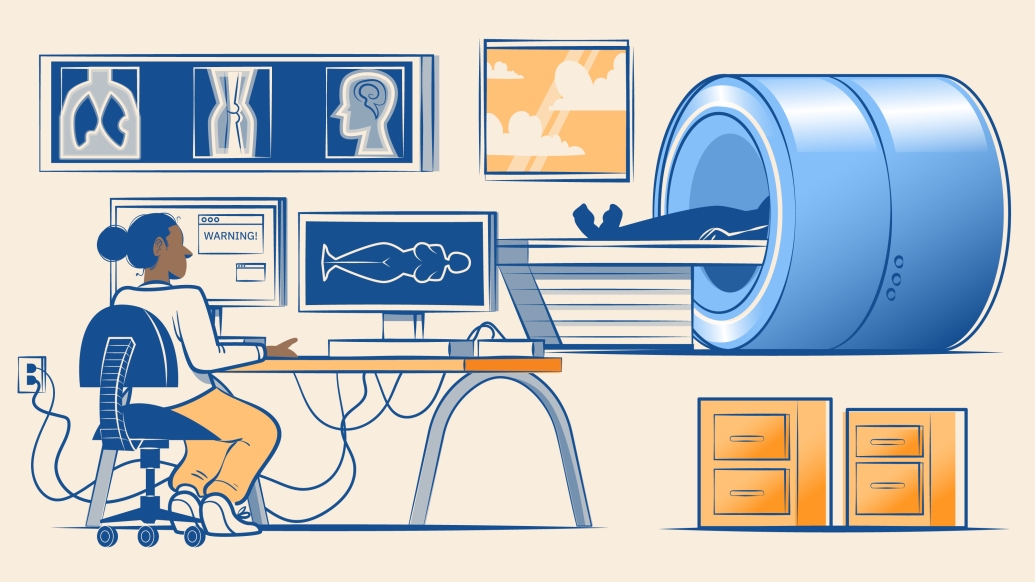Knowing every abnormality in your body is tempting, but experts say ignorance may be bliss
5:00 AM
Author |

In recent news, Kim Kardashian made an Instagram post about a whole-body MRI scan she received and the benefits she saw from it, encouraging her followers to do the same.
While a whole-body MRI scan seems like a great preventative health tool from the outside, it might do more harm than good.
Scans, like the one Kardashian had are meant to find any cancers, aneurysms or other harmful anomalies within the body before they become something untreatable and/or life threatening.
While it’s tempting to know what's going on inside your entire body, a recent clinical perspective piece written by Matthew Davenport, M.D., a radiologist at the University of Michigan, discusses some of the harms of imaging low risk patients, such as overdiagnosis, overtreatment and their related complications.
Less is more
According to Davenport, approximately 15% to 30% of all diagnostic imaging in adult patients contain at least one incidental finding.
These are small abnormalities in the body that are doing no harm and wouldn’t have been located unless a scan was performed of that area.
“Incidental findings happen in any type of MRI or CT scan, typically while conducting a scan to find something else,” said Davenport. “New whole-body MRI scans are scans that seek out incidental findings, which make the results seem more alarming than they are.”
Patients that receive incidental findings from scans are at an increased risk of experiencing overtreatment, creating the illusion of benefits while, instead, causing harm to themselves.
Screenings, such as these, are more likely to identify indolent disease, one that grows slowly or not at all, than an aggressive type.
Although it can cause panic and a feeling of urgency to treat, addressing it can actually cause more harm than good.
“Most incidental findings don’t need to be treated, and aren’t serious. However, attempting to maximally diagnose [patients] causes significant costs and time, results in additional testing and procedures, and their related complications, and can result in emotional and physical harm," said Davenport.
"It makes healthy people think of themselves as patients," he noted.
Most patients will feel physically better if they leave their indolent diseases or incidental findings alone, Davenport says. For many, knowing every abnormality in your body can increase anxiety and change how you view your personal health, causing negative mental side effects.
“If you went into the scan feeling normal and came out seeing all your incidental findings as problems, it is going to change how you feel about your health,” said Davenport. “Now, your view of your quality of life has changed to something negative when that might not be the case. This can be very stressful and anxiety inducing for many patients.”
The allure of a whole-body MRI is the possibility that the scan locates a cancerous mass in the body before it would have started causing the patient symptoms or harm, resulting in early and potentially life saving treatment. But, according to Davenport, this is very unlikely to happen in healthy, asymptomatic patients without significant risk factors.
“There is a reason that there is no cancer society, radiology society, or credited medical society that recommends whole-body MRI screening in asymptomatic healthy patients without risk factors,” said Davenport.
“It is not a safe and effective way to detect potential ailments early in the average healthy person.”
Proper screenings
Most radiologists would not recommend patients have a whole-body MRI, unless there's a medical history that proves otherwise.
“Imaging is appropriate for patients who have a genetic risk of life-threatening cancer or have a sign or symptom of significant disease,” said Davenport. “Balancing risks and benefits is best suited through a conversation between a patient and their health care provider.”
When it comes to the general population, Davenport says ignorance is bliss.
“Many patients will have indeterminate findings within their bodies that will appear on a whole-body MRI,” Davenport said.
“Typically, they aren’t cause for concern, but the uncertainty induced by identifying them often results in extensive diagnostic workups with little benefit and the potential for harm. For majority of patients, the harms of this approach outweigh the benefits.”
If you have concerns about an illness based on family history or are concerned about an incidental finding on a scan, it's important to have a conversation with your primary care physician before starting any treatment.
Authors on this paper include Matthew S. Davenport, Department of Radiology and Department of Urology at the University of Michigan Health System
Study cited: “Incidental findings and low-value care,” American Journal of Roentgenology. DOI: 10.2214/AJR.22.28926

Explore a variety of health care news & stories by visiting the Health Lab home page for more articles.

Department of Communication at Michigan Medicine
Want top health & research news weekly? Sign up for Health Lab’s newsletters today!




